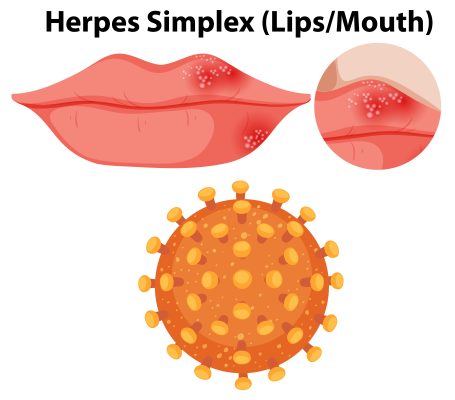What is Herpes Encephalitis?
Herpes Encephalitis, often referred to as Herpes Simplex Encephalitis (HSE), is a rare neurological condition distinguished by inflammation of the brain. It’s caused by the herpes simplex virus (HSV), which can enter the brain and trigger an infection. This condition can be an acute or subacute illness, causing both general and focal signs of cerebral dysfunction.
HSE is important due to its potential severity and high fatality rate if left untreated. Although rare, it’s the most common cause of sporadic fatal encephalitis worldwide. After primary infection, HSV-1, one type of the herpes simplex virus, can affect the central nervous system where, in rare cases, it replicates and triggers an acute and inflammatory response.
Symptoms of HSE can include headache, fever, and other signs of cerebral dysfunction. In really bad cases, it can lead to hemorrhagic lesions in the brain. The disease requires quick diagnosis and treatment to prevent potentially serious complications, reinforcing the importance of awareness and understanding of this health issue.

Herpes Simplex Encephalitis
Understanding the Herpes Simplex Virus (HSV)
The Herpes Simplex Virus (HSV) is a widespread virus that belongs to the Herpesviridae family. It is primarily divided into two types:
Herpes Simplex Virus Type 1 (HSV-1) is the most common, often associated with oral infections (oral herpes). It typically manifests as cold sores or fever blisters around the mouth. However, it can also cause genital herpes through oral-genital contact. Transmission occurs directly with infected saliva, skin, or mucous membranes.
Herpes Simplex Virus Type 2 (HSV-2): This type is mainly associated with genital herpes, causing sores in the genital or anal area. It is generally transmitted through sexual contact, particularly during outbreaks when the virus is active.
Both HSV-1 and HSV-2 are highly contagious and can be spread even when there are no visible symptoms, though the risk of transmission is higher when sores are present. Once inside the body, these viruses can remain dormant before triggering an outbreak. They can also travel along nerve paths to reach the brain, potentially leading to severe conditions like herpes encephalitis.
Herpes Virus
Herpes Encephalitis, commonly called Herpes Simplex Encephalitis (HSE), is a severe illness that causes broad and focal signs of cerebral dysfunction. It’s a rare neurological disorder characterized by brain inflammation (encephalitis) caused by the herpes simplex virus.
HSV, a human herpes virus, comes in two types. HSV-1 is generally associated with oral infections, while HSV-2 primarily causes genital infections. However, both types can cause encephalitis. After primary infection, usually during childhood, HSV-1 can lie dormant in the body and reactivate under certain circumstances. In rare instances, the reactivated virus can reach the central nervous system, where it replicates and triggers an acute inflammatory response.
This inflammation can lead to symptoms ranging from headache and fever to severe neurological symptoms such as seizures, hallucinations, and behavioral changes. In the most severe cases, it can cause hemorrhagic lesions in the brain.
Statistically, HSE affects at least 1 in 500,000 individuals per year, according to Wikipedia. It’s considered the most common cause of sporadic fatal encephalitis worldwide. Despite advancements in antiviral therapy, the mortality rate remains high at approximately 70% without treatment. Even with treatment, around 20% of patients do not survive, and many survivors are left with neurological damage.
The exact mechanism of how HSV leads to encephalitis is not fully understood. It’s believed that the virus travels through the olfactory or trigeminal nerve pathways to reach the brain. Once in the brain, the virus causes inflammation and necrosis of brain tissue, leading to the symptoms of encephalitis.
Is Herpes Meningitis the same thing as Herpes Encephalitis?
Herpes Meningitis and Herpes Encephalitis, while related, are not the same thing. Both conditions are caused by the herpes simplex virus (HSV), but they affect different parts of the central nervous system.
Symptoms of Herpes Encephalitis
Herpes Encephalitis is a severe condition that can present with various symptoms. These may vary between individuals but often include:
- Fever: This is one of the most common symptoms, occurring in approximately 90% of cases.
- Headache: This symptom is present in about 81% of cases.
- Psychiatric Symptoms: These can include confusion, agitation, hallucinations, and altered mental status. They occur in roughly 71% of cases.
- Seizures: These can range from mild to severe and are seen in about 67% of cases.
- Vomiting: This occurs in around 46% of cases.
- Focal Weakness: This refers to weakness in specific body areas and is present in approximately 33% of cases.
- Memory Loss: This can result from the disease affecting the brain’s temporal lobes.
- Photophobia and Sonophobia: Sensitivity to bright light and sound, respectively.
- Meningism: Symptoms similar to those of meningitis, including neck stiffness.
- Neurological Deficits: These can include focal cranial nerve defects, hemiparesis (weakness on one side of the body), dysphagia (difficulty swallowing), and aphasia (trouble with speech).
It’s vital to find medical attention immediately if you or someone else is experiencing these symptoms, especially if they’re accompanied by a high fever or changes in mental status. Early diagnosis and treatment can considerably enhance the outcome of this severe condition.
Who is at Risk for Herpes Encephalitis?
Herpes Encephalitis, while rare, can affect individuals of any age group. However, certain factors increase the likelihood of developing this condition:
Previous Outbreaks of Herpes Simplex Virus Infection: Individuals who have had prior outbreaks of herpes simplex virus (HSV-1 or HSV-2) are at a higher risk of developing herpes encephalitis.
Weakened Immune System: Individuals with compromised immune systems, such as HIV/AIDS, undergoing chemotherapy, or receiving organ transplants, are more susceptible to severe HSV infections, including encephalitis.
Age: While herpes encephalitis can occur at any age, it appears more common in the young and the elderly. Neonates can be particularly at risk if exposed to HSV (usually HSV-2) during birth. Similarly, older adults may have a higher risk due to age-related erosion of the immune system.
Invasive Monitoring during Birth: Prolonged rupture of the membranes and intrauterine monitoring, such as the attachment of scalp electrodes, are considered risk factors for neonatal herpes encephalitis.
Understanding risk factors is crucial for the detection and treatment of herpes encephalitis. Individuals at higher risk must be aware of the symptoms and get medical attention if herpes encephalitis is suspected.
Diagnosis for Herpes Encephalitis
Diagnosis of HSE requires a high index of clinical suspicion. The disorder may present symptoms similar to other neurological conditions, including headaches, fevers, drowsiness, hyperactivity, and/or general weakness.
The gold standard for diagnosing HSV encephalitis is the HSV cerebrospinal fluid (CSF) PCR test, which boasts 98% specificity and 94% sensitivity. This process involves a lumbar puncture (also known as a spinal tap), where a sample of the fluid surrounding the brain and spinal cord (cerebrospinal fluid) is taken for testing.
In most instances, a brain biopsy may be required to verify the diagnosis, but this is less common due to the invasive nature of the procedure.
Treatment for Herpes Encephalitis
The primary treatment for Herpes Simplex Encephalitis is intravenous aciclovir, an antiviral medication. Treatment must commence as soon as possible after the onset of symptoms to increase the chances of a positive outcome.
Aciclovir has been a game-changer in managing HSV encephalitis, reducing mortality from above 70% to around 10-20%. Despite this, some patients do not survive even with treatment; many survivors are left with neurological damage.
Given HSE’s severity and potential fatality, medical professionals must maintain high suspicion when presented with the typical features of encephalitis, such as fever, headache, confusion, and other neurological symptoms.

Prevention Strategies for Herpes Encephalitis
Preventing herpes encephalitis primarily involves avoiding exposure to the herpes simplex virus (HSV) and practicing safe habits. Here are some strategies:
Avoid Direct Contact: HSV is typically transmitted through contact with an infected person’s lesions, mucosal surfaces, or body fluids. Therefore, avoid kissing or having other close contact with people with visible cold sores or symptoms of a genital herpes outbreak.
Practice Safe Sex: HSV-2, which primarily causes genital herpes, is usually transmitted through sexual contact. Condom use reduces the risk of transmission.
Good Hygiene Practices: Regular hand washing, especially after touching your face or genitals, can help prevent the spread of the virus.
Avoid Sharing Personal Items: Avoid sharing items such as towels, utensils, lip balm, or razors with someone with an active herpes outbreak.
Antiviral Medication: They can help reduce the frequency and severity of outbreaks for those already infected with HSV, thus lowering the risk of transmission.
Education and Awareness: Increasing awareness about HSV infection, its symptoms, and prevention methods can play a crucial role in reducing transmission rates.
While no measures are known to be effective for preventing herpes encephalitis, specifically in adults and older children, these strategies can help reduce the risk of HSV infection and, therefore, the potential for developing encephalitis.
Remember, early diagnosis and prompt treatment of individuals with herpes simplex encephalitis are vitally important, as this improves the efficiency of treatment options.
Living with Herpes Encephalitis
Living with Herpes Encephalitis can be challenging due to the potential long-term effects of the illness. Even with treatment, some people may experience lasting consequences.
Possible Long-Term Effects
- Memory Impairment: This is one of the most common long-term effects, affecting approximately 69% of patients. This can include both short-term and long-term memory problems.
- Personality and Behavioral Abnormalities: These are seen in about 45% of patients1 and can significantly impact a person’s quality of life.
- Epilepsy: Approximately 24% of patients develop epilepsy as a long-term effect of Herpes Encephalitis.
- Cognitive Deficits: Some people may have trouble thinking and controlling their bodies.
- Sensory Impairments: Some individuals may experience difficulty with hearing, seeing, or other sensory functions.
- Neurological Impairments: These can include focal neurological deficits and general weakness.
Support and Resources
Managing these long-term effects can be difficult, but there are resources available for support:
- The Encephalitis Society provides information and support to those affected by encephalitis.
- Rare Diseases offers resources and information on rare diseases, including Herpes Encephalitis.
- Regular follow-ups with healthcare providers can help manage symptoms and monitor health.
- Mental health professionals can provide support for dealing with the psychological impact of the condition.
- Support groups, both virtual and in real life, can deliver a feeling of community and shared experience.

Conclusion
Herpes Encephalitis is a severe and potentially life-threatening condition caused by the herpes simplex virus. It presents various symptoms, including fever, headache, psychiatric symptoms, seizures, vomiting, focal weakness, memory loss, photophobia and sonophobia, meningism, and neurological deficits.
Key risk factors for developing herpes encephalitis include previous outbreaks of herpes simplex virus infection, a weakened immune system, age (very young or elderly), and certain conditions during birth like prolonged rupture of the membranes and invasive monitoring.
While herpes encephalitis can be severe, early detection and treatment significantly improve the prognosis. Antiviral medication, such as acyclovir, is commonly used to treat this condition, often resulting in reduced mortality and improved neurological outcomes.
Suppose you or someone else is experiencing the symptoms of herpes encephalitis, especially if they’re accompanied by a high fever or changes in mental status. In that case, it’s crucial to seek medical attention immediately. Individuals at higher risk should be particularly vigilant about the symptoms.
Remember, while information is power, it is not a substitute for professional medical advice. Always consult a healthcare professional if you have any concerns about your health. Your health and well-being are worth it. Stay informed, stay safe, and take care.
Medically Reviewed by Julie Hutchinson, MD on August 1, 2023
Secure and Confidential
STD testing services
The fastest results possbile - available in 1 to 2 days

Tagged
Categorized As
Author: STD Check Editorial Team
At STDCheck.com, we go to great lengths to ensure quality content. We’re using our own collection of data. It is not bought or made up for “click-bait” purposes. We don’t entice traffic with cheesy graphics or raunchy headlines. Our information is to promote STD testing, educate people, let go of social stigmas, and bring awareness. We also provide a completely confidential atmosphere through private testing. When we produce an article, it is fact-based. We check it with medical advisors that approve it. Our staff consists of doctors and other medical professionals who peer review the content we make available on STDCheck.com. From all over the world, we have sourced the best and the brightest content developers, including medical professionals, marketing engineers, data scientists, content specialists, and media relations.




